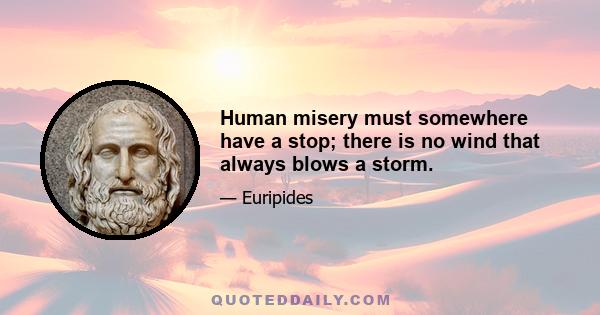Euripides Quotes - Page 8

Human misery must somewhere have a stop; there is no wind that always blows a storm.
Euripides (2013). “Euripides III: Heracles, The Trojan Women, Iphigenia among the Taurians, Ion”, p.20, University of Chicago Press
The man who knows when not to act is wise. To my mind bravery if forethought.
Euripides (1959). “Euripides: Ion. Rhesus. The Suppliant women. Orestes. Iphigenia in Aulis. Electra. The Phoenician women. The Bacchae”
Men hate the haughty of heart who will not be the friend of every man.
Euripides (2013). “Euripides I: Alcestis, Medea, The Children of Heracles, Hippolytus”, p.195, University of Chicago Press
"Sisyphus". Play by Euripides, 415 BCE.
Of all things upon earth that bleed and grow, a herb most bruised is woman.
Euripides (2013). “Medea”, p.25, Lulu.com
Euripides, G. S. Kirk (1979). “Bacchae of Euripides”, p.136, CUP Archive
The company of just and righteous men is better than wealth and a rich estate.
"Aegeus". Play by Euripides, 431 BCE.
Euripides (1863). “The Tragedies of Euripides: Hercules furens. The Troades. Ion. Andromache. Suppliants. Helen. Electra. Cyclops. Rhesus”, p.175
Euripides (2013). “Euripides III: Heracles, The Trojan Women, Iphigenia among the Taurians, Ion”, p.20, University of Chicago Press
Euripides (2013). “Euripides I: Alcestis, Medea, The Children of Heracles, Hippolytus”, p.202, University of Chicago Press
What good can come from meeting death with tears? If a man Is sorry for himself, he doubles death.
Euripides (1942). “Euripides”
Sweet is the remembrance of troubles when you are in safety.
"Andromeda". Play by Euripides, 412 BCE.
It's not beauty but fine qualities, my girl, that keep a husband.
Euripides (1958). “Euripides: Hecuba, translated by W. Arrowsmith. Andromache, translated by J. F. Nims. The Trojan women, translated by R. Lattimore. Ion, translated by R. F. Willetts”
Euripides, Rex Warner (1993). “Medea”, p.39, Courier Corporation
"Alcestis". Play by Euripides, 438 BCE.
Euripides (2013). “Euripides IV: Helen, The Phoenician Women, Orestes”, p.119, University of Chicago Press






